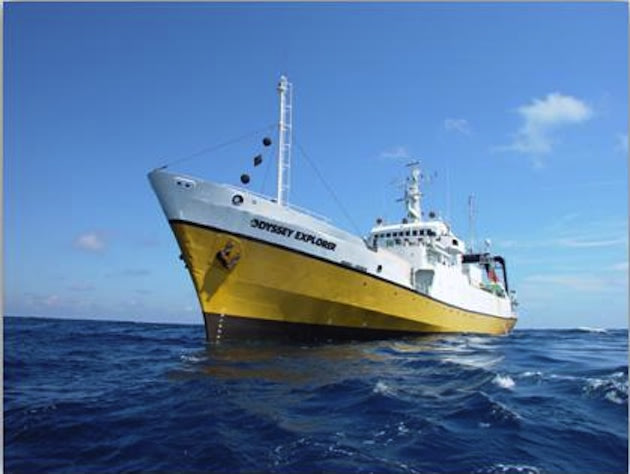 The Odyssey heads out on one of its voyages. (Discovery Channel)In July 2012, the crew of the deep-sea recovery team Odyssey Marine Expedition (OME) unearthed a record-setting 48 tons of silver from a sunken World War II-era British naval vessel, the SS Gairsoppa.
The Odyssey heads out on one of its voyages. (Discovery Channel)In July 2012, the crew of the deep-sea recovery team Odyssey Marine Expedition (OME) unearthed a record-setting 48 tons of silver from a sunken World War II-era British naval vessel, the SS Gairsoppa.
A camera crew was along for the ride, documenting the trip three miles below the surface. This Sunday, Discovery Channel viewers will have the chance to ride along with the crew of the OME to see firsthand what a deep-sea treasure hunt looks like during the broadcast of ?Silver Rush.?
OME?s Senior Project Manager Andrew Craig and CEO Mark Gordon spoke with Yahoo News about the voyage and what viewers can expect.
?The big thing with this expedition is we went looking for a wreck in such deep water. The Gairsoppa was sunk in water nearly a mile deeper than the Titanic,? Craig said. ?We knew the silver payload was on the manifest, but as far as where we could find it when we got there, we really didn?t know when we started this sort of adventure.?
?The challenge we had was how to surgically open up a shipwreck in 15,000 feet in water,? added Gordon. ?It was a little like looking for a needle in a haystack.?
In fact, when the OME recovered the 48 tons of precious metal, the discovery temporarily sent the world silver market prices reeling.
?I don?t think anything will ever again carry that huge amount of silver,? Craig said. ?These were just such uncommon times during World War II. The British government had to get this back to the U.K. for the war effort."
The story of the Gairsoppa is fascinating. It was a tram steamer enlisted to aid the war effort, along with many other nonmilitary vessels. During the trip from India back to the U.K., the ship ran low on fuel and became separated from its convoy of 26 vessels.
As it drifted astray, the Gairsoppa was tracked down and torpedoed by a German U-boat. Thirty-six members of the 86-man crew made it into lifeboats, about 400 miles from the shore.
?These merchant seaman, it was almost another army of people that nobody really knows about,? Craig said. ?They were on boats that just didn?t have any protection. They were at the luck of the gods as to whether they even made it back or not.?
After weeks adrift at sea, only three men made it to shore alive. And by the time British medical personnel made it to the lifeboat, only one man, Richard Ayres, remained alive.
?Richard Ayers was in the water for 17 days before he eventually ended up on the south coast of England,? Craig said. ?Despite going through that tragedy, he went on to have a fulfilling life, went back to work on the sea and lived to be 90 years old before passing away in 1990.?
Hosted by Mike Rowe, the "Silver Rush" series will also follow the OME crew as they explore two other vessels with cargoes worth a collective $1 billion or more: The SS Mantola, an ocean liner that sank in 1917 off the Irish coast, and HMS Victory, the former flagship of the Royal British Navy which was lost in 1744 while housing what may now be worth upward of $1 billion in gold.
Gordon says the OME uncovered far more than the record-setting 1,023 bars of silver from the Gairsoppa, including 1,700 tons of tea, burlap bags ?full of God knows what,? the captain?s personal silver service set and other ?really interesting artifacts.?
?We?re not done. We?re going back this summer,? Gordon said. ?We?ve only recovered 42 percent of the registered, insured cargo.?
 Some of the record-breaking 1,023 bars of silver discovered by the Odyssey (Discovery Channel)
Some of the record-breaking 1,023 bars of silver discovered by the Odyssey (Discovery Channel)
Ryan Lochte Montenegro Olympic Games Dana Vollmer phillies phillies Ryan Dempster
No comments:
Post a Comment